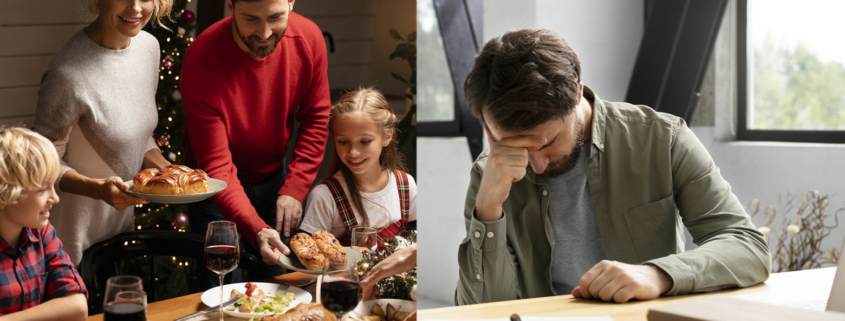How to Help Those in Addiction Recovery This Holiday Season
‘Tis the Season! The holidays are quickly approaching, and while most people enjoy the holiday season, we all know how stressful this time of year can be. Whether it’s the work demands of finishing a project before taking time off, shopping for everyone on your list, preparing meals, or even getting the house ready for family gatherings (and out-of-town guests), these stressors can impact us physically, mentally, and emotionally.
From Thanksgiving to Christmas and New Year’s, this time of year can be filled with holiday parties — and alcoholic beverages. For someone struggling with alcohol addiction or substance use disorder, this could create a difficult time of battling triggers and cravings.
The Pressure of Social Gatherings
The holidays can be very overwhelming to those struggling with an addiction, whether they’re in short or long-term recovery. Stress levels are often heightened by working to maintain recovery, connecting with their sponsor, attending meetings, and guarding against holiday triggers. If it is the first holiday season of a person’s addiction recovery journey, it can be hard to know what these triggers are or how to help in avoiding them.
Coping With Triggers
Holiday triggers come in all forms, including sights, sounds, smells, traditions, family members, co-workers, etc. We all have triggers that bring us discomfort, but for those going through addiction treatment and recovery, holiday triggers can bring their mind back to thoughts, feelings, and emotions that are uncomfortable and difficult to address without proper support.
Say “No”
As the season approaches, it is important to learn how to handle holiday triggers, whether you are on your own addiction recovery journey or want to support someone. Some triggers are avoidable by saying “no” to certain holiday events, dinners, parties, and other activities that are compromising. If you know, or even suspect, that an event or situation could expose you to a damaging trigger, boundaries can be set to say “no” before you go.
Book-End Your Holiday Events
Some triggers are unavoidable. In these instances, we refer to a technique called “book-ending.” “Book-ending” is talking to your sponsor before and after any event you attend, discussing the feelings, emotions, and triggers that might come along with it. If you cannot avoid a situation, reach out to your support system or sponsor before it occurs — and after.
Collect Recovery Capital
What is “recovery capital?” Recovery capital includes the family and friends who are part of your support system, as well as the support of meetings, sponsors, support groups, and other activities that are around you (including all of the people and things that are helping you on your journey). Collecting this capital before the holiday season, so that you know who you can turn to when you need support, is one of the best ways to protect yourself from these holiday stressors.
Create Healthy Holiday Traditions
The holiday season is a difficult time for those in a substance abuse treatment program or long-term journey. Holiday stress alone affects those struggling with mental health disorders, and can sometimes leads to drug use to cope.
One way to avoid these triggers is to start new, healthy holiday traditions with your sober friends — or anyone who supports your recovery journey. Instead of holiday parties with alcohol, make new traditions like baking together or seeing a movie. By replacing triggering traditions with sober-friendly alternatives, you can still celebrate the season without risking your recovery.
Take Care of Yourself
The best thing you can do to support your recovery journey during the holiday season is to take care of yourself — and this looks different for everyone. It could mean avoiding parties. It could mean doing your favorite self-care routine. It could even mean taking time to do something for yourself instead of worrying about others. Because this time of year is revered as the “season of giving,” it is easy to put yourself last. Protecting yourself and your sobriety should come first.
How to Support Your Loved One’s Journey
Family and friends of those who are in recovery also go through an adjustment period where they are trying to cope and support, along with identifying possible holiday triggers. Sometimes as a family member or friend, you must make adjustments to your own holiday routine to create a more comfortable atmosphere for that individual in recovery. A bottle of wine in the dining room for dinner or a six-pack of beer that accompanies the football game can easily be replaced with non-alcoholic alternatives like juice, soda, or water. Instead of focusing on what you have to give up, focus on all that you will be gaining in return when that loved one is able to spend quality time with loved ones, share laughs, and make positive memories.
Individuals in active addiction, newly sober, or in long-term recovery all consistently work on creating and maintaining healthy substance-free lifestyles while working through life’s challenges. Support is important.
Holiday Help for Your Mental Health
Whether you are going through recovery yourself or have a loved one who is, know that the holiday season can be a stressful time. But, they can also be enjoyable if we are mindful and prepared. We can easily become caught up in great reflection during the holidays and the New Year. Regardless of our circumstances, this year, let’s also take the time to enjoy the present experiences and be thankful for each moment spent together.
If you or a loved one are struggling this holiday season, Meridian HealthCare is here when you need help. We understand how holidays and addiction affect each other and how to support your recovery journey. As an addiction treatment provider, our services include inpatient detox, outpatient programs, counseling for mental health conditions, and more. When you’re ready, we’re here to help.





